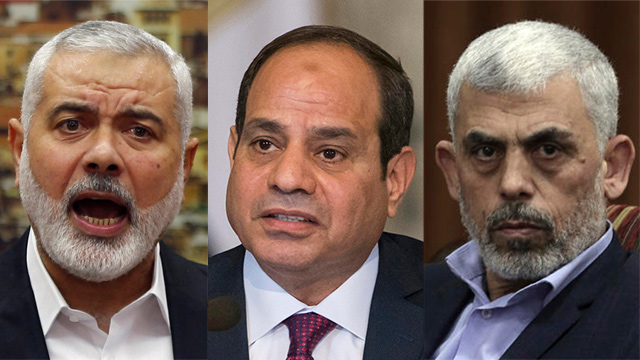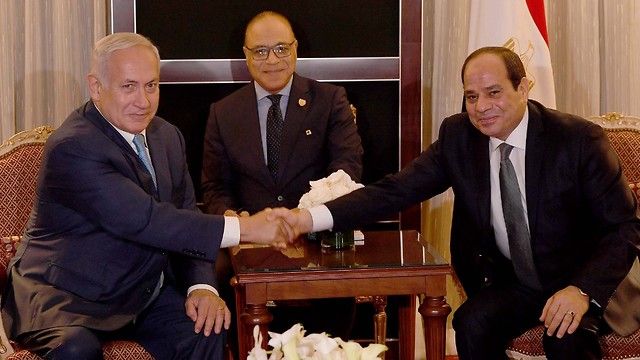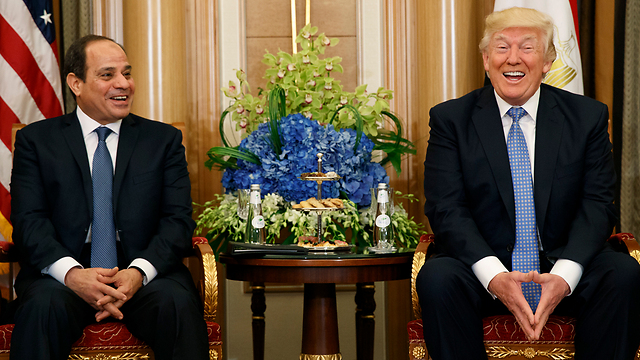
He needed to know where Cairo stood with regards to Gaza, what kind of ceasefire they were working towards, what their intelligence assessments said. He probably even spoke directly to Egyptian President Abdel Fattah el-Sisi.
Sisi has a long history with Hamas and the trouble it causes, dating back to his previous roles as military governor in northern Sinai, head of Egyptian intelligence, and defense minister. He knows the ins and outs of the Hamas efforts to bond with the Muslim Brotherhood, the Islamist movement that led Egypt before him - a group that he despises.
It isn’t a secret that the Egyptian president doesn’t believe anything Hamas says. His senior advisors, who have been managing the negotiations with Gaza, despise the Hamas leadership and make no effort to hide it.
But what Sisi wants is quiet on his side of the Gaza border, and thus negotiations are in his best interests. He wants no more attempted infiltrations via the Sinai from Hamas, in order to carry out terror attacks in Egypt.
The Egyptian find their role in this exhausting game frustrating. They are mediating between two sides who don’t believe one another. Hamas makes statements showing Egypt in a positive light, but closely follows the unique relationship Sisi has with US President Donald Trump and Prime Minister Benjamin Netanyahu. Hamas believes it was Netanyahu who pushed Sisi into Trump’s arms, but also knows there is no other possible negotiator for their conflict with Israel.
Turkish President Recep Tayyip Erdoğan doesn’t have the access that Egypt has, and has disputes with both Israel and Egypt. Qatar is more ATM machine than mediator. (On Tuesday, the Qataris said they plan to build Hamas leader Ismail Haniyeh a new office, after his Gaza City headquarters were bombed by the IAF on Monday night.)
The Egyptians understand that Netanyahu wants quiet until the April 9 elections. Cairo sees Netanyahu as keeping his seat as prime minister — in fact, whomever I spoke to in Egypt thought Netanyahu would win, and all quickly stressed the importance of this unique, secretive relationship between the Israeli and Egyptian leaders.
Indeed, when Sisi took office four years ago, he wanted nothing whatsoever to do with whatever Hamas, Islamic Jihad and Israel were fighting about. He wanted to focus on Egypt and its financial woes.
Israel was the one to inform Sisi that if he didn’t take control of the situation, the EU, US or Turkey would be waltzing into the Gaza Strip. They stressed that being the sole mediator has perks for Egypt.
And so Sisi suppressed, but didn’t quite disguise, his loathing towards Hamas. In official meetings, he is businesslike and speaks in English, but behind the scenes and away from the negotiating table, he resorts to blunt swear words in Arabic.

During the latest clashes between Israel and Hamas, Cairo tried to persuade Jerusalem to pull its punches in Gaza, to do just enough to cause insult but not real injury. The Egyptians wanted Israel to stick to IAF airstrikes and then depart.
Conversely, the Egyptians did not believe a single word from Hamas regarding their purportedly "erroneous" rocket launches at Israel. Cairo sent strongly worded messages to the organization, warning that if it continued in this vein, Egypt would look the other way when Israel unleashed its vast military capabilities on Hamas.
Egypt is watching both sides carefully. Cairo itself has a single agenda, and that is to establish itself on the global stage. Israel would do well to help with this ambition.



















